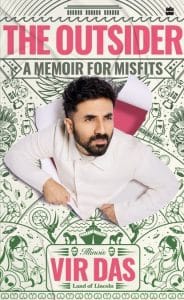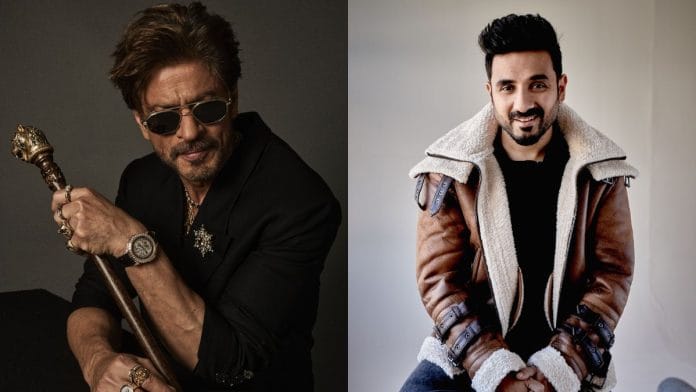I made my big movie debut wearing a curly black wig and glasses, which you really should google if you haven’t already. So there I was, this short Indian comedian acting alongside the Ryan Gosling of Bollywood. I felt totally out of place, but I loved it, which is the story of my life. So at this point life is pretty good. Shivani and I have moved in together. I’m getting enough corporate work to tide me over and make rent, and then I made Delhi Belly.
I got to be where magic is created from nothing, a film set where kids from small towns show up to be part of someone else’s madness until hopefully, someone is dumb enough to fund their own madness. It’s hard to describe how addictive that is. When I quit/lost my job at CNBC because I was too busy juggling it with film work and a global recession was coming down, film was all I wanted to do. While we waited for Delhi Belly to come out, Imran and Ranbir Kapoor, who may still be the top actor in India today, were set to host the Filmfare Awards. The Filmfares are like our Oscars, with like 98,000 more sponsors and 7,000 percent more attitude. They had been struggling with a scriptwriter who had been around for about twenty years and was writing jokes as if he had been around for twenty years.
By the way, as I write this, I realize I’ve been around for close to twenty years, and now I am having an existential crisis about my own age and writing. And so it goes.
The Weirdass gang was called in on a Hail Mary to see if we would write some segments and sketches. We did, and it went great. It was possibly the most stressful writing gig I’ve ever experienced. Very little time to work, rushed deadlines, total pressure. Then the following year, 2010, we got a call to write for Shah Rukh Khan. Yup. That one. Mumbai-suitcase-by-the-sea-balcony-platform – six-thousand-people-on-Sunday-waving Shah Rukh Khan. I was invited to Mannat, his dream house by the sea. Imagine George Clooney mixed with Marlon Brando inviting you to his 27,000-square-foot mansion.
You know someone has achieved an otherworldly level of wealth and fame when even their house has a name that literally translates into “Dreams.” So welcome to one of the most terrifying experiences of my life. This was the first time I was exposed to true fame. People who are as famous as he is can call meetings at strange hours, because who would question him? He’s Shah Rukh Khan.
Also read: When Malala attended the Diwali Ball at Oxford
I arrived at the appointed time—11:00 p.m.—and was met at the door by a security guard, who politely asked, “Where have you come from?” I was so nervous I replied, “Myself. I’m Vir Das. I’ve come from myself.” I was there to get hired as a writer, and my first conversation out of the gate was a total failure and made zero sense. The guard led me into the grand study lined with grand bookshelves. I waited there for three hours, alongside a few other mere mortals who were called to hold court with Khan. It was me, a doctor, a politician, and a few event organizers all waiting around. To ease my nerves, I gorged on his fancy food and looked at his books while we waited. Then he arrived.
Court began. All I remember is that he walked in followed by roughly seventeen people, who moved like they were extra parts of his body. You got the distinct impression that this was someone who was NEVER alone. Which made me fascinated by what he possibly did or thought about when he was alone. He smoked a cigarette and said, “You read the script?” The room was utterly quiet as he and his posse waited for my reply. “Sir . . .” “And?” “I don’t think it’s funny.” More silence while everyone exchanged looks that very clearly tele-graphed the thought “This dumb punk kid is getting tossed off the balcony and into the sea.”
Khan stood up and walked closer to where I sat. “All right,” he said. “Let’s see what you’ve got.” Translation: “Bring it, young blood.” So the kid who got kicked out of boarding school, the one who snuck porno magazines onto a Lagos rooftop and got left behind by a Carnival Cruise ship, was writing jokes for an icon who was worshipped by millions. If I fucked this up, I was pretty sure I was done. I would have to leave India and start a comedy scene somewhere else, somewhere remote and humorless, like Siberia, or maybe I’d just go back to my boarding school, as a teacher.
I pitched jokes for five hours, got some laughs, and changed some punch lines while he smoked and drank black coffee. We wrapped at about 7:00 a.m. I could see the sun starting to come up over the ocean through the antique-looking and yet somehow entirely automated electronic wooden blinds. “Go home and rest up, and come back later,” said Khan. “We’ll start again then.”
I basically moved into his study in Mannat for four days to work on his jokes. I was in my twenties and he was forty-something, so I’m sure some of the material I came up with was immature, but he was never patronizing, and always kind. People say you shouldn’t meet your heroes, but Khan was an exception. Hanging around him was unlike anything I’ve ever experienced. If you’ve ever seen someone walk into a room and felt the energy shift, that’s what it was like. When he walked into a room I could feel the ground move, and I mean this in the literal sense. When he walked onstage at the Filmfare Awards, thousands of people shifted in their seats, I swear. I’ve played large crowds myself, but I have never experienced anything like that. It’s another level. You can’t manufacture that kind of magic or charisma or whatever the hell you want to call it. He just had it.
Here’s the thing: Being a writer is heartbreaking business. You write words that you fall in love with and then you have to watch someone butcher them. Weirdass Comedy wrote almost every major award ceremony in India for the next three years, for almost every single major Bollywood star as a host. Khan is the only person I’ve seen take a line, make it entirely his own, and then somehow make it better. Khan has met millions of people, and each one of those meetings likely meant way more to the person than it probably did to him. Do you know how many writers for movies, books, articles, ads, and more he meets a year? Probably thousands. But somehow, he makes you feel like you are the only person in the room, and that your voice is being heard. He also makes sure you are fed when you’re in his house—and that’s very, very Delhi. For that brief moment he spends with you, he finds a way to be kind and entirely present. It’s something I have tried to learn, a feeling I try to conjure up each time I go onstage.
I try to make my audience feel the way he made me feel. I haven’t always succeeded, but it’s a noble goal to make someone feel entirely seen, heard, and like they’re part of your story. That’s when fame truly means something beautiful. We love Khan because he is the king, and yet he is the perpetual epitome of an outsider. The Delhi boy who showed up with a suitcase, no contacts, no family backing, and built a house by the sea. If it’s possible for him, it’s possible for us.
I’ve toured the world, I’ve made movies, I’ve become a part of show business, I’ve crashed and burned, been canceled, been investigated, made my way back. I now have a global audience, bigger than the Blue Frog. I am, by many people’s yardstick, a success. But I know only two things for sure: I’ve been audacious, and I connect with people. Whether it’s moving to Mumbai, putting flowerpots down onstage, deciding to be in the movies, heading to Alabama, going on prime time, or starting a company. I have never believed something I do is going to be small. In my mind, it’s going to be huge, and it’s going to require everything I have. There is no other way.
I’ve usually been wrong, but when I’ve been right, boy, have I been right. I think that’s really the only upside of fame. You can believe that something is going to happen. Khan or Dave Chappelle can wake up in the morning and think of something and know that it is probably going to be believed in, funded, listened to, and seen. The amount of time that passes between them having an idea and that idea reaching a green light is down to the minimum. I’ve woken up with eighty ideas in my head every single morning since I was eighteen, and fame to me means reducing that time span between having an idea and having someone green-light that idea. That span is still far from short enough.
I recognize that even though the person on the stage is literally elevated, the audience members are the ones on a pedestal. I learned that from being in the room with greatness when I was very young. Most truly famous people, most truly great artists, understand how humbling the experience of being in front of an audience can be. Fandom is fickle. But attention and respect, hopefully, last a long, long time. I wrote the Filmfare Awards later that year. Twelve years later, I had just turned my phone on again after going underground after having performed at the Kennedy Center, which got me canceled and which you’ll read more about soon.
After that debacle, I came back to Mumbai and was keeping a low profile, editing a show I had just starred in that we all were convinced no one would buy. “Starring the terrorist Vir Das, here’s a show for kids!” Everyone, from my management, to my family, to the press, to the industry had written me off. I was taking a cigarette break at the edit suite when I got a call from an unknown number. I answered. “Vir. Shah Rukh.” I froze. “Khan?” He said yes and laughed, as if we talked every single day. I had never spoken to this man on the phone in my life. He had just heard something I had said about him on Whitney Cummings’s podcast the year before. I have too much respect for him to share exactly what he said. I won’t talk about what he and his family had been through that year. But let’s just say he was kind, during an extremely rough year in my life. I will share that he ended with “This is my number. Now you have it if you need me for any help.”

This excerpt from ‘The Outsider’ by Vir Das has been published with permission from HarperCollins Publishers India.






